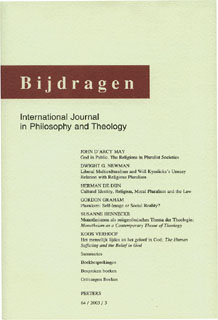next article in this issue  |

|
Document Details : Title: Religie, fragmentering en rationaliteit Subtitle: Religion, Fragmentation and Rationality Author(s): CLOOTS, André Journal: Bijdragen Volume: 60 Issue: 1 Date: 1999 Pages: 3-24 DOI: 10.2143/BIJ.60.1.2002338 Abstract : Against the ‘great narrative’ of religion in the Middle-Ages, Modern Times are the times of differentiation. For religion that means that it becomes one sphere of culture, among others. On the other hand, religion sheds its light upon all the rest. The religious man “cannot help seeing every problem from a religious point of view” (Wittgenstein). To deal with religion today, means to deal with that paradox. The differentation coming up in modern times ends up in a kind of de-differentation or fragmentation, so characteristic for our post-modern culture. Pushed to its extreme, this leads to two opposite reactions, both prominent on the contemporary religious scene, viz. a religion “à la carte” on the one hand, and fundamentalism on the other. In the process of differentiation, there always is the tendency of one sphere taking over the whole field. The great narratives of modernity were a first attempt to keep all the spheres at their proper place, but it was only a first and still naive attempt. The real problem turned out to be the status of reason and more specifically the status of metaphysics (and ‘metaphysical’ reason). In this article a concept of reason is defended – building upon Lyotard’s treatment of Kant’s faculty of judgement – in which reason is the instance of analysis and critique, opening up an interplay between all the spheres of culture, without founding them or bringing them together into one all-encompassing ‘whole’. Such a reason is, as Lyotard says, like an admiral, going between all the islands of the archipelago, without having an ‘absolute standpoint’ of its own, but always moving within its vast ‘milieu’, viz. the sea. Such a faculty of (hermeneutical) reason is eventually the only means to keep not only religion but also science at its proper place. |
